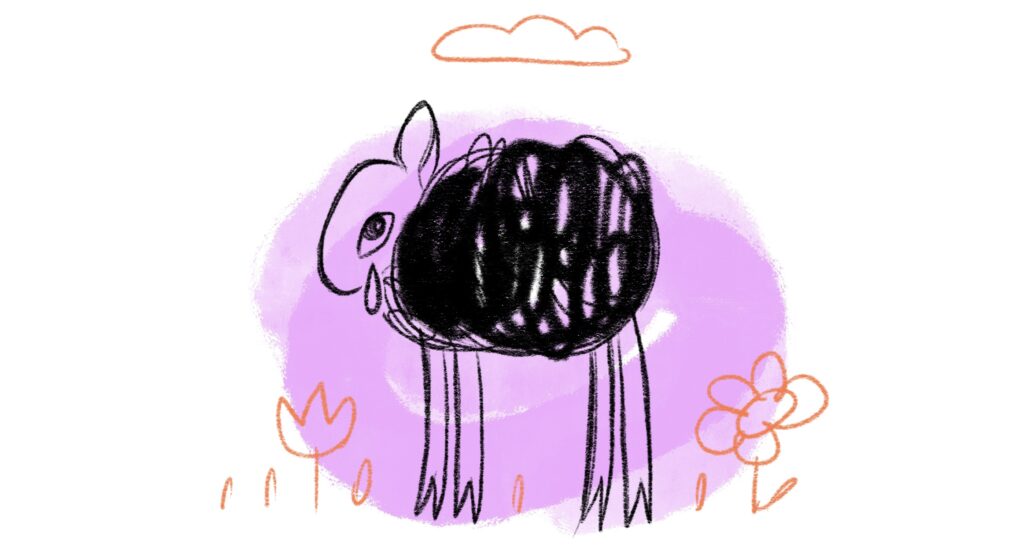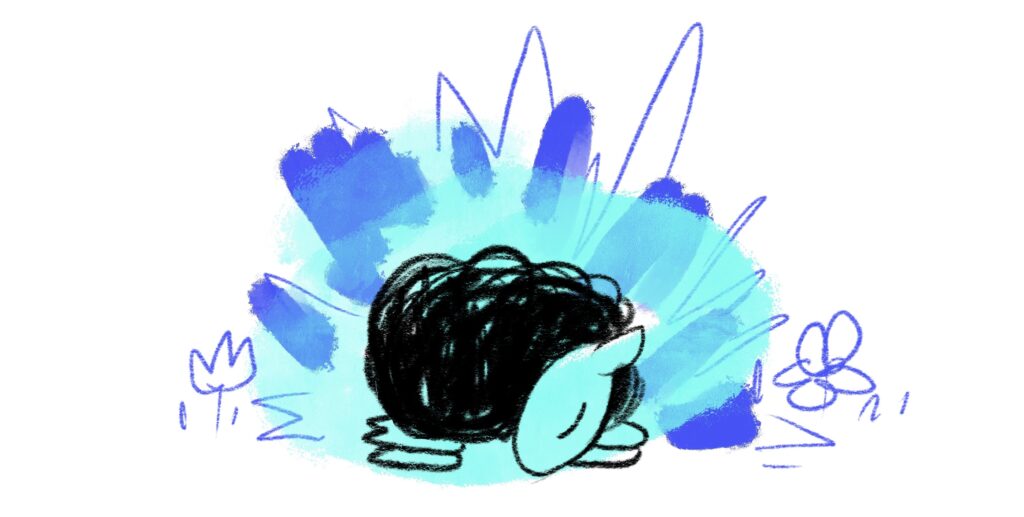My gift is that I am quick, spontaneous, creative, and pretty distant from perfectionism. I’ve always struggled to understand why perfectionism is so highly valued—it just stifles creativity. At least that’s what I thought until I realized I do have one wall of perfectionism: blogging.
Throughout my life, I’ve been labeled “stupid,” so subconsciously, I began shaping my blog into something that had to be extremely polished and correct. I have a pile of drafts in my notes app—facts, history, and challenging topics about mental health and neurodivergence in society, history, and politics. But I haven’t been able to “pull myself together” to sit down and write because of the weight of shame that whispers: “You’re too dumb to write about these topics.”
The truth is, I’m not dumb. I’m a living encyclopedia of facts, and my loved ones are constantly amazed by how I can blurt them out uncontrollably. But the problem is, I’ve never been able to write them down properly. This isn’t because I’m stupid—it’s because I’m disabled.

This realization inspired this blog post and will guide future ones as well: I don’t need to plan for ages what I’ll write. Instead, I’ll write as it comes—“straight from the pen”—because that’s my gift. Maybe I’m also a bit inspired by my comfort show, Gossip Girl, where the writing is fast and dramatic. While I’m not aiming to be the next gossip queen, I can embrace the niche: writing about my life as it is and weaving in my mental health journey.
My target audience? My past self. How would I have wanted to access information about neurodivergence back then?
When new people ask me, “How does your autism and ADHD show up for you? You don’t look like one.” I always feel like handing them a PDF file. But now, even better—I have a blog! If I were to write out all my symptoms here, it’d probably turn into a full book. So, I got inspired to write about the symptoms I never imagined were connected to autism and ADHD. Perhaps this list will inspire others who are neurodivergent—or anyone genuinely curious about these topics.
It’s important to note that both autism and ADHD exist on a spectrum, meaning symptoms vary greatly. No two autistic or ADHD individuals are exactly the same. Our life experiences and brain development shape what comforts us, what has traumatized us, and what gives us dopamine.
So, welcome to my list of things I thought weren’t related to my diagnoses (but, lol, they are!).

1. “But you maintain eye contact!”
Exactly. I also thought I couldn’t possibly be autistic because I communicate well, maintain intense eye contact, and am very aware of how my body language looks. Why? Because I manually learned all of it! Turns out most people don’t read books or attend workshops on how to communicate “normally.” Of course, they also haven’t been shamed their entire lives for being “rude” in how they interact.
So, neurodivergent people often learn social norms manually, setting aside their own needs to please others. This is exhausting for our nervous system and is why many neurodivergent individuals prefer to withdraw. I was the same for most of my life—until I got my diagnoses.
Now, I still maintain aggressive eye contact because as a child, I was constantly told, “If you don’t look someone in the eye, it means you’re lying.” So now I stare into your soul to prove I’m telling the truth. A weird habit, but I can’t unlearn it anymore. Oh well!
2. “Do you like trains?”
Movies often show an introverted white man, socially awkward, obsessed with trains. That couldn’t possibly be me, right? Well, it turns out this is called a “special interest,” and it can be about anything. Jackpot—you don’t get to choose it; it’s a gift from your brain. Whether it’s capitalistically profitable or not is another matter entirely.
Lucky me! My special interests are art and psychology (which, in my brain, are the same thing). Thankfully, I’ve been able to make a living off these gifts. As for trains? Well, yes, the stereotype holds: trains are the only public transport I’ll voluntarily use.

3. “But you manage your life just fine.”
I don’t mind sincere questions about autism and ADHD, but this statement can be a bit triggering. I can’t answer it without revealing my entire medical history and life’s darkest moments.
The human ability to adapt for survival is incredible—but at what cost? There’s a limit, and once the brain reaches it without help, suicidality often follows. Is “managing” life worth that outcome? Absolutely not. But for people who’ve never hit their limit, it’s hard to understand.
I hit my limit as a child because my needs weren’t met. Now, with my diagnoses, I’ve found many tools to help myself. But the most important one is community. Other people’s support. Society pushes hyper-individualism onto us, but it doesn’t serve anyone—least of all disabled people.
The phrase “What doesn’t kill you makes you stronger” is nonsense. What doesn’t kill you makes you weaker. Strength comes from support, understanding, and community. That’s the cornerstone of trauma recovery.
4. “But you sit still.”
ADHD is Attention Deficit Hyperactivity Disorder, so I never felt it applied to me. I can sit in one spot drawing for seven hours straight—that’s not my issue. But this misconception about ADHD is misleading. The truth? ADHD is a dopamine deficiency!
I get my dopamine from drawing for seven hours, living in my fantasy world. That’s why most women are diagnosed with ADHD much later in life, often after burning out (hello, call comes from inside the house). We don’t feel like the “hyperactivity” part fits us.
Yes, I struggled in school—fell asleep, couldn’t focus, and didn’t understand anything. But that’s because the material was either too hard ( dyscalculia: inability of anything maths) or just boring. And the lighting was awful, the clothes uncomfortable, and I’m not a morning person—hello? But give me a book on Egyptian history, dinosaurs, or aliens, and I’ll be a fact-spewing machine for weeks.

5. “What hyper-sensitivity?”
Sensitivity, empathy, and a wide emotional spectrum are so shamed in our society that I didn’t even consider them part of my diagnosis. Therapy and cognitive behavioral therapy (CBT) constantly told me something was “wrong” with my emotionality and my sensitivity to the injustices of the world.
After my diagnoses, I now see that a wide emotional sensitivity is a gift. Just like people with less emotional sensitivity have their gifts, both are needed in this world. Society tries to explain emotions as the opposite of logic, but that’s false and harmful. Emotions and logic are different tools, like a saw and a hammer. You don’t use a hammer when you need a saw. You don’t use a hammer where a saw is needed. Emotions are met with empathy and logic with solutions. In our society, we are only taught to use a hammer. That’s how we shame the saw, even though it’s as important tool.
Sensitivity brings creativity, community, and love to the world. I know this may sound “cringy” to some readers, but these are fundamental human needs. Capitalism, hyper-individualism, and the pressure for quick productivity push these needs out of the frame and shame those who naturally embody sensitivity.

These are just a few key points, but I could write endlessly on the topic. I’ve been thrilled to meet people who’ve listened to my guest spots on podcasts like ”(Mure)vabaks” and “Veits Sassis” and hear how my insights helped them find clarity. The overwhelming feedback from my “Black Sheep” art exhibition also healed something in me.
Hearing that children brought their parents to see my exhibit moves me deeply: art connects generations and fosters understanding. It’s a powerful motivator to keep speaking out and creating on these topics. Thank you!

